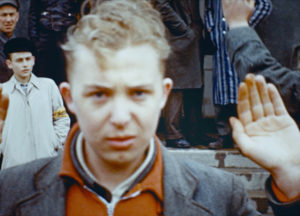
“Final Account,” a new documentary from recently deceased English director Luke Holland, is as straightforward in its presentation as it is complicated in its subject matter. For 90 minutes, elderly Germans look into Holland’s camera and describe their former lives as Nazis.
The interviews, which began in 2008, proceed more or less chronologically, beginning with the interview subjects’ time in Hitler Youth and Jungvolk and continuing along a path that audiences are familiar with: the prewar mania of nationalistic fervor and Hitler-worship, the escalating oppression of Jews, Communists, the disabled and other minorities, the veneration of violence and racial purity, the march to war, the initial victories, the open secret of the concentration camps, and then, finally, the slow-motion defeat of the Nazis.
The story of Allied victory over fascism doesn’t have that same neat structure when the story is being told by Germans with varying degrees of attachment to the defeated political regime.
Most of them express some sort of regret for having been in the Wehrmacht, the Waffen SS or other armed bodies of the Third Reich. But not all do, and even among those that do feel that what happened in Nazi Germany was unequivocally wrong, there is a strong feeling that they had no choice but do what they did.
From bookkeeper to concentration camp guard, the impression one gets from the collected testimony is that there wasn’t a single genuine Nazi in all of Germany. If they weren’t too young to speak up, they say, then they didn’t have the power to resist the social current, or didn’t have the inner courage to accept death as a consequence for disobeying orders (whether that calculation was borne out in reality is unclear.)
On the less repentant end of spectrum, among those who have dispensed with the self-preservation of a filter in their old age, the interview subjects caress their old medals from a special box in the closet, or wax poetic on the irreplicable camaraderie of their units.
In perhaps the most harrowing interview in “Final Account,” one man comes clean: The project may have failed, he says, and it may have gone awry in some places, but the animating goals were noble. “The ideas were correct,” the man says, his neck flapping a bit above a tightly-knotted tie and a banana-colored sweater vest. This humanitarian is willing to say that the Jewish population of Germany should have simply been compelled to leave, rather than killed.
Holland’s hand is light, sometimes frustratingly so. There’s no voiceover, no narration, almost nothing to let viewers know the salient fact that Holland learned later in life that his mother was a Jewish refugee from Vienna and that his maternal grandparents died in a concentration camp. He intersperses the interviews with archival footage of German life during the Nazi era, along with some information here and there to give context to the next round of questions or the subject matter being discussed.
Aside from a pivotal scene toward the end, the movie consists primarily of uninterrupted testimony. Holland does push at times, and as the movie reaches its galling final interview, the questions get more pointed, and he presses on despite the apparent hostility and discomfort, one mark of a good interviewer (or interrogator).
But from beginning to end, Holland operates with tremendous restraint toward those whose early lives were dedicated to eradicating that impulse. Most of the time, this restraint seems humane, the solemn mission of a dedicated historian, one who just wants to get the information out there. Other times, I wonder if Holland was simply stunned into silence by what he heard. I certainly was.
There is one scene where Holland announces his intentions in a more obvious way, and the movie is better off for it.
Hans Werk, a Waffen SS veteran from Berlin, addresses German students at the villa where the Final Solution was devised. He describes the shame that he feels about his past with “the murderous organization,” but he’s soon embroiled in a shouting match with one student who accuses Werk of offloading his own shame at being German onto younger people. Why should he feel any shame, the student asks, about something he took no part in? Why does Werk fear the contemporary reignition of the impulses that brought about Nazism, the student presses on, when he should be afraid that he’ll be killed by an Albanian migrant on the train?
“You should be afraid of that, but not of your own kind,” the student says.
Werk tries to remain calm, to maintain the distance from his own actions that he did during his interviews with Holland. But the student has disturbed him.
It’s one thing to put some distance between yourself and your actions in an interview, a sealed space where you can imagine that the only receptor for your signal is your interlocutor and an audience you’ll never meet. But what happens when a whole generation distances themselves from their actions in that way? What dark signal does that send to the generations that follow? The answer comes in the form of the student who castigates Werk for his lack of pride.
The whole scene lasts about seven minutes and is incredibly uncomfortable to watch. It’s also the centerpiece of the movie.
In “Final Account,” Holland lifts up some deeply-wedged stones to take a look at some loathsome creepy-crawlies. But Holland doesn’t expose that wriggling evil in a righteous mission to stamp it out, nor does he aim to give his audience a cheap gross-out (“Look how disgusting this is!”).
Instead, he puts the creepy-crawlies under a microscope to show us something. Those markings, that antennae, those pincers: You don’t necessarily have to go around flipping rocks to find them. Check your backyard.
The film begins showing at the Ritz Five on May 21.
[email protected]; 215-832-0740



